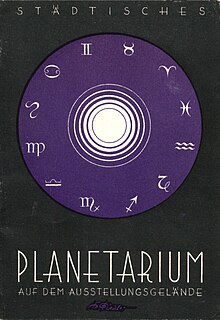|
Kurd Kisshauer Kurd Kisshauer (* December 29, 1886 in Berlin; † November 14, 1958 in Frankfurt/Main)[1] was a member of the German society for astronomy. During the Third Reich he was employed at Amt Rosenberg. LifeKisshauer (in German also Kißhauer) possessed a doctorate in political science. He soon gained a greater reputation, however, as an amateur astronomer. In 1919, he was charged with selling the equipment of the closed observatory in Bothkamp. In 1922, Ernst II, Duke of Saxe-Altenburg engaged him for the newly set-up observatory in Wolfersdorf. Afterwards Kisshauer moved to the near Jena where he worked at Carl Zeiss and wrote first publications on astronomy and projection planetaria designed by Walther Bauersfeld. In 1926, he founded and led the municipal planetarium of Dresden, situated north-west of Großer Garten. Around 1930 Kisshauer moved to Berlin where he lived in the Großsiedlung Siemensstadt.[2] As a fellow worker of Alfred Rosenberg he was charged during World War II with psychological warfare, distributing specially written horoscopes. Kisshauer was the contact person of Karl Ernst Krafft, collecting and evaluating his material. In 1941, he got deeply involved in Nazi internal conflicts on astrology after the "Hess affair". Moreover, he imposed some influence to prevent followers of Einstein's theory of relativity from getting professorships in theoretical physics. After war Kisshauer again gave lectures on astronomy, e.g. at Senckenberg Gesellschaft für Naturforschung and in radio broadcasts. Ellic Howe quoted him in his books on astrology in the Third Reich, regretting that it was not possible to interview Kisshauer because of his death some years before. Works
LiteratureAbout the astronomer
About time with Rosenberg
Notes
External links
|